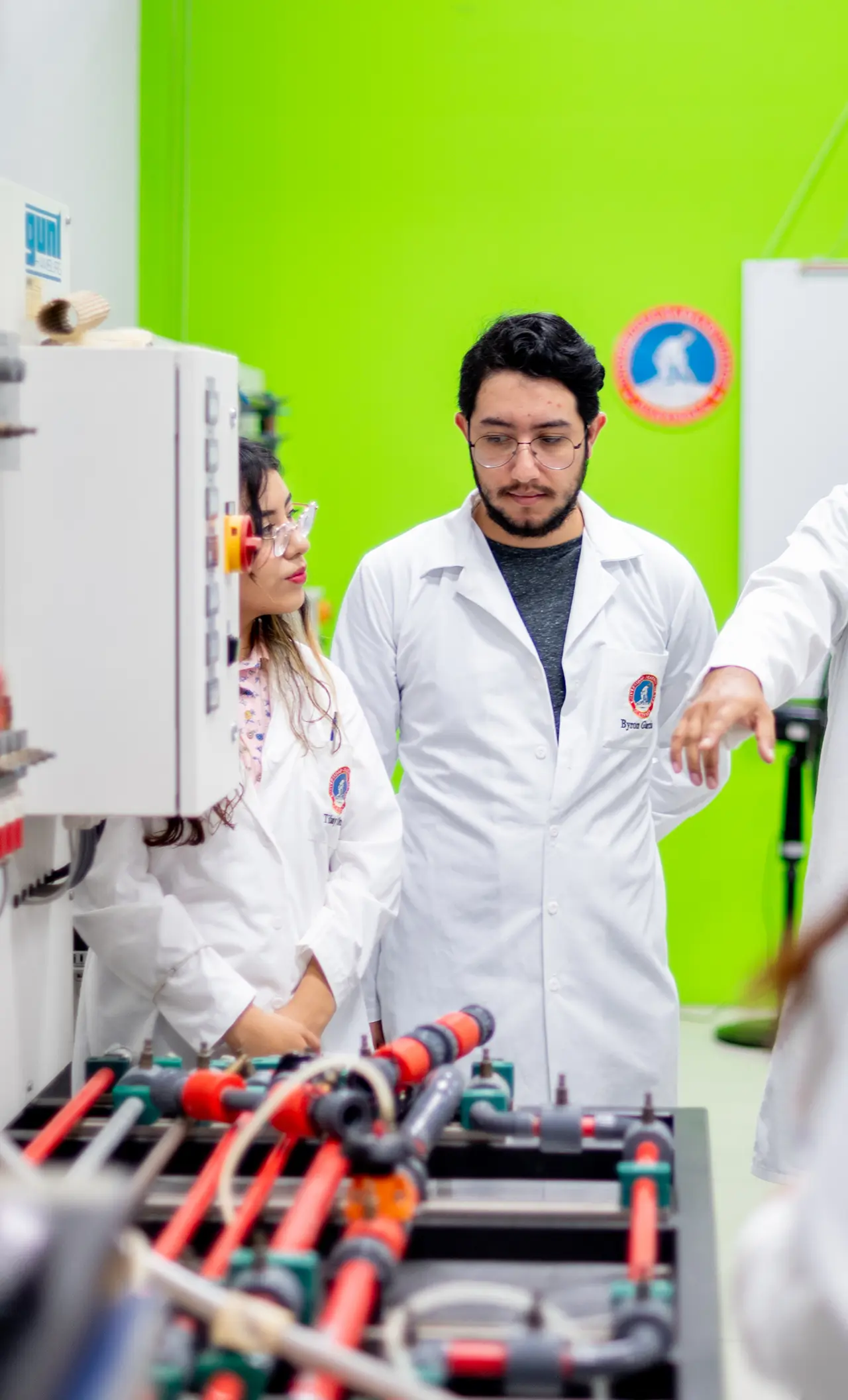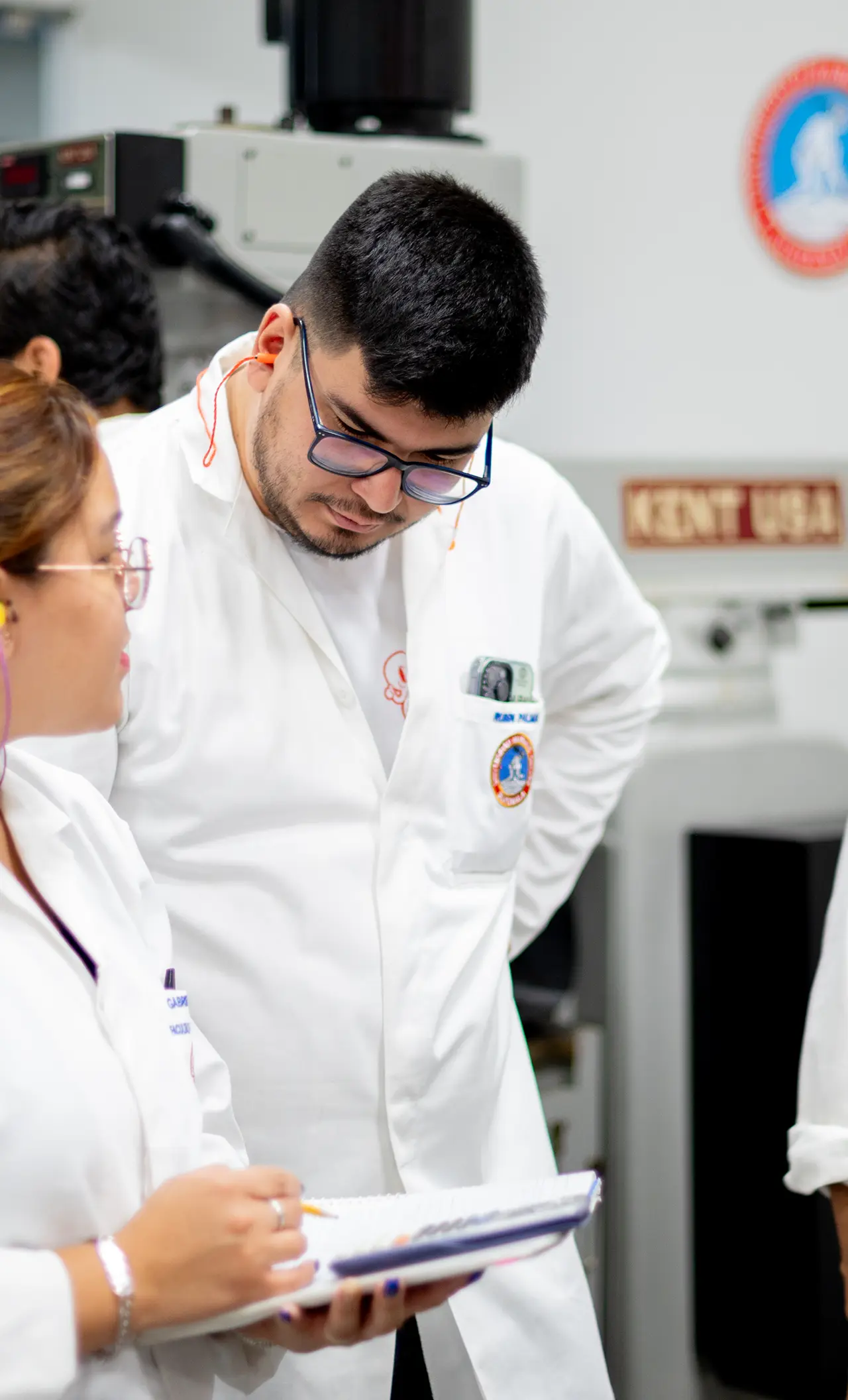
- Bachelor's Degree in
- Electrical Engineering
- Degree to be obtained
- Bachelor's Degree in Electrical Engineering
- Academic degree
- Bachelor's Degree
- Duration
- 5 and a half years
- Modality
- In-person and virtual
- Schedule:
- Daily Morning and afternoon sessions
- Career description
-
To train professionals capable of interpreting the phenomena in which electrical energy intervenes, making possible its planning, generation, transmission, maintenance and use in a safe, efficient, economic and sustainable manner. With knowledge of electrical power systems, automation, control and power electronics, competent, analytical, able to solve problems, manage and administer projects, establish effective communication and with a high sense of professional responsibility to make efficient and rational use of resources.
- What will you learn during the program?
-
To guide the design of electrical, electromagnetic, electronic and electrical systems for the generation, transport and distribution of electrical energy and their applications.
Gallery
AdmissionProfile
- Possesses a general knowledge of the field of electrical engineering and have an inclination for it.
- The aspiring electrical engineer should be a person with knowledge and skills in the physical and mathematical sciences.
- Possesses the skills and knowledge to communicate orally and in writing in a satisfactory manner.
- Has a general knowledge of national and international social problems.
- Possesses sensitivity, creativity and social commitment.
- Has the ability to solve problems.
Graduate'sProfile
- Design electrical energy production, transmission and distribution systems.
- Establish control standards and procedures that guarantee the efficient operation and safety of production and distribution systems, motors and electrical equipment.
- Have the ability to design, create, optimize and maintain maintenance programmes.
- Have the ability to operate and construct generating stations, substations and power lines.
- Basic knowledge of circuit theory, electronics and microprocessors.
- Instrumentation, metering, power generation and electrical networks.
- Control, residential and industrial electrical installations.
- Knowledge of projects and unit prices.
- Designing, analyzing and constructing electrical equipment and/or systems to solve problems.
- Simulate models to predict the behavior of electrical systems using computational platforms.
- Design and solve problems in the productive sector by means of automation, instrumentation and control.
- Develop and manage research and/or technological development projects.
- Plan, organize, direct and control activities of installation, updating, operation and maintenance of electrical equipment and/or systems.
Career Opportunities

Analysis, design and development of domestic, industrial and power electrical systems. Industrial automation. Systems for the generation, transformation, transmission and supply of electrical energy.
Curriculum
| 1° Ciclo | ALGEBRA SUPERIOR | DESARROLLO HUMANO Y PROFESIONAL | DIBUJO ASISTIDO POR COMPUTADORA | GEOMETRÍA PLANA Y DEL ESPACIO | QUÍMICA INORGÁNICA I | |
|---|---|---|---|---|---|---|
| 2° Ciclo | ALGEBRA LINEAL I | CALCULO I | HISTORIA Y COMUNICACIÓN CIENTÍFICA | PROGRAMACIÓN PARA LA CIENCIA Y LA INGENIERÍA I | QUÍMICA INORGÁNICA II | |
| 3° Ciclo | ALGEBRA LINEAL II | CALCULO II | ESTADÍSTICA Y PROBABILIDAD PARA LA CIENCIA Y LA INGENIERÍA | FÍSICA I | PROGRAMACIÓN PARA LA CIENCIA Y LA INGENIERÍA II | |
| 4° Ciclo | CALCULO VECTORIAL Y MULTIVARIABLE | ECUACIONES DIFERENCIALES ORDINARIAS | ESTADÍSTICA INFERENCIAL | FÍSICA II | METODOLOGÍA DE LA INVESTIGACIÓN EN INGENIERÍA | |
| 5° Ciclo | ANÁLISIS DE VARIABLE COMPLEJA | ECUACIONES DIFERENCIALES PARCIALES | FÍSICA III | LEGISLACIÓN PARA INGENIEROS | PROCESOS ESTOCÁSTICOS | |
| 6° Ciclo | ANÁLISIS NUMÉRICO | CIRCUITOS ELÉCTRICOS I | FÍSICA IV | SEÑALES Y SISTEMAS | TEORÍA ELECTROMAGNÉTICA I | |
| 7° Ciclo | CIRCUITOS ELÉCTRICOS II | CONVERSIÓN DE ENERGÍA ELECTROMECÁNICA I | ELECTRÓNICA ANALÓGICA | ELECTRÓNICA DIGITAL | TEORÍA ELECTROMAGNÉTICA II | |
| 8° Ciclo | CONVERSIÓN DE ENERGÍA ELECTROMECÁNICA II | INGENIERÍA ECONÓMICA | INTRODUCCIÓN A LA GENERACIÓN DE ENERGÍA ELÉCTRICA | MÁQUINAS ELÉCTRICAS I | SISTEMAS DE CONTROL ANALÓGICO | |
| 9° Ciclo | ELECTRÓNICA INDUSTRIAL | INSTALACIONES ELÉCTRICAS | LÍNEAS Y REDES ELÉCTRICAS EN MEDIA Y ALTA TENSIÓN | MÁQUINAS ELÉCTRICAS II (TRANSFORMADORES Y GENERADORES) | SISTEMAS DE CONTROL DIGITAL | SISTEMAS DE POTENCIA |
| 10° Ciclo | ALTAS TENSIONES | ANÁLISIS DE SISTEMAS DE GENERACIÓN | INSTRUMENTACIÓN INDUSTRIAL | RELEVACIÓN INDUSTRIAL | SUB-ESTACIONES ELÉCTRICAS | |
| 11° Ciclo | AUTOMATIZACIÓN INDUSTRIAL | EMPRENDIMIENTO, INNOVACIÓN Y PROYECTOS | MANTENIMIENTO DE SISTEMAS ELÉCTRICOS | MERCADOS ELÉCTRICOS | REGULACIÓN Y NORMAS ENERGÉTICAS | SISTEMAS DE PROTECCIÓN ELÉCTRICA |


